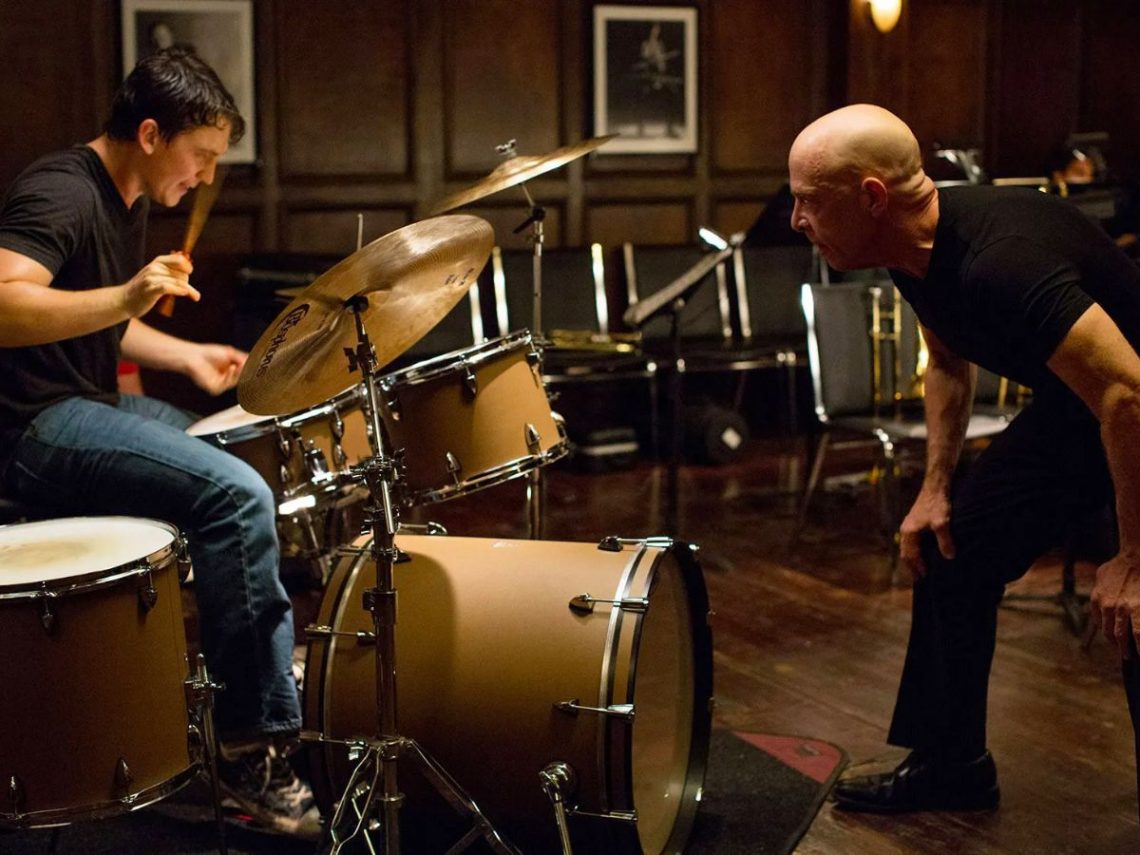The mammoth hit, Whiplash, is arriving on Netflix this week, and the movie deserves your undivided attention less you have a metal chair thrown at you. Such is the movie’s intensity and of the central figure of Terence Fletcher, played by J. K. Simmons, who demands absolute perfection from his class.
We’ve all had bad teachers, but Terence Fletcher really takes the biscuit. J.K Simmons plays the part of the maniacal music teacher to a tee, but his most memorable moment has to be the “not quite my tempo scene”, in which Fletcher zooms in on Andrew’s (Miles Teller) playing during a rehearsal of ‘Whiplash’. Because most of us aren’t well-versed jazz drummers, whether Andrew is “rushing” or “dragging” is as unclear to us as it is to Andrew. Well, thankfully, somebody who does know a thing or two about rhythm has given us a concrete answer.
The scene in question is central to the psychological drama at the heart of Whiplash. It establishes Andrew and Terence’s relationship and introduces us to the idea that it could easily spiral out of control. But the question remains: was Andrew rushing or dragging the beat? Well, one Reddit user may well have the answer.
After admitting that they’d never seen the film in full, the user offered an analysis of the scene by chopping the audio into different takes in Ableton and then lining them up to see “how much difference there was between each take”. They noted that the “easiest hit to see is the second kick and snare, hit so to get meaningful numbers, I’ve measured each of the takes from that point”.
There are eight takes in total, but the tempo difference between them is imperceivable to most listeners, these differences being just a few milliseconds. “The first four takes have that snare land within 24 milliseconds of each other. According to Fletcher, none of those takes were ‘quite his tempo'”. After analysing a graph of when each of the takes occurred, the user found: “Each of the takes is within 100 milliseconds of the other. The slowest that he drags was in the 9th take, which is 106ms slower than the fastest he rushes which was in the 5th take.”
They continue: “I’m not sure of the exact tempo of each of these takes, but to give a sense of the small amount of difference in each of the takes, I’ve arbitrarily assigned the fastest take a tempo of 95BPM, so that I can illustrate how small the difference between each of the takes actually was. If the fifth take (rushing) was at 95BPM, then here are the tempos of each of the other takes, along with the comment that Fletcher offers:
- 5th take = 0ms = 95.00 BPM (you’re rushing)
- 8th take = 18ms = 93.59 BPM (dragging)
- 2nd take = 44ms = 91.65 BPM (downbeat on 18)
- 1st take = 56ms = 90.78 BPM (not quite my tempo)
- 4th take = 61ms = 90.34 BPM (not quite my tempo, it’s all good no worries)
- 7th take = 63ms = 90.23 BPM (rushing)
- 3rd take = 76ms = 89.31 BPM (bar 17, the “and” of 4)
- 6th take = 83ms = 88.84 BPM (dragging, just a hair)
- 9th take = 106ms = 87.67 BPM (hurls a chair at him)
They then go on to observe that Andrew is accused of rushing the 7th take, despite it being slower than the 8th take, which he is accused of rushing. “But the truth is, even switching between the different takes with them on loop, it is very difficult to tell them apart,” they continue. “In conclusion, no, Fletcher wasn’t being accurate. He definitely was just being an asshole to Andrew. I haven’t actually watched the movie, but my analysis shows that he is a big fat jerk.” Where the Reddit user found the time to conduct this research, I don’t know, but I thank them nonetheless.
